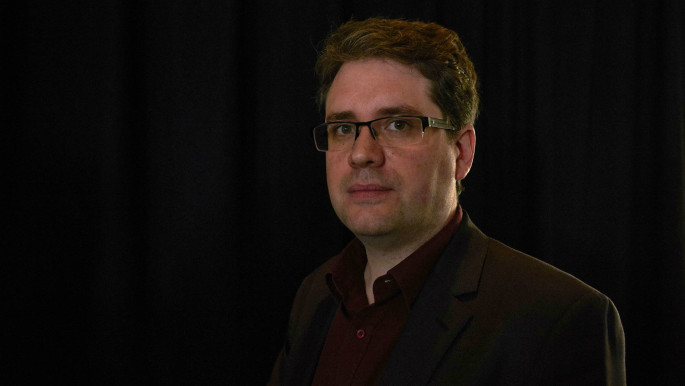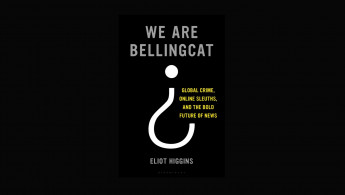 |
Hunting for the truth behind important world events with We Are Bellingcat
How did he know who to call? Through Bellingcat – an organisational hub for a growing community of internet investigators.
Digital technology developments mean that people with a reliable internet connection can access huge amounts of free information, including from satellites, social media, digitised company records and transport routes.
Many different sectors are exploring ways to exploit this, including government agencies, commercial enterprises and investigative journalists. The work is often dubbed OSINT – open-source intelligence – referring to its reliance on 'open' (non-classified) information.
Bellingcat and its founder Eliot Higgins have been at the forefront of work using OSINT methods to shine a light on atrocities and other human security risks.
This makes We Are Bellingcat an important book, detailing an insider's account of the emergence and growth of OSINT and new forms of citizen investigations. It is also a good book – a pacey, surprising and insightful read, describing the hunt for truth in important world events, such as investigations into the British press hacking scandal, and the downing of Malaysian Airlines Flight MH17 over Ukraine.
The book traces Higgins' entry into OSINT, leading into the foundation of Bellingcat. Higgins comes across as an unlikely hero, transforming himself from dissatisfied admin worker to pioneering internet sleuth by curiosity and persistence.
The growth in his investigations, and his need for an income, built towards his formalising existing collaborations within one organisation, Bellingcat, named from the Aesop's fable in which a young mouse proposes an early warning system by belling the cat. It is relevant that the fable ends with the cautionary question "who will bell the cat?", indicating the risks involved.
 |
Bellingcat, named from the Aesop's fable in which a young mouse proposes an early warning system by belling the cat |  |
Bellingcat researchers are subject to smear campaigns and death threats, and watching countless horrific images makes them vulnerable to post-traumatic stress disorder.
 |
|
| Read also: Bellingcat: Where technology meets investigative journalism |
We Are Bellingcat describes how digital investigators do their work. All events leave marks; by finding and 'lining up' different marks, researchers can figure out facts about the events.
The work is painstaking and can be time-consuming; two people spent a year going through social media profiles to understand a Russian military unit implicated in shooting down MH17.
It is also essentially collaborative, needing people with varied knowledge and skills to piece together different elements, including people accessing and analysing data remotely, and people on-the-ground collecting and sharing local information.
The book shows that self-motivated internet investigators can uncover facts more effectively than traditional intelligence or law enforcement agencies.
Higgins and Bellingcat have alerted the world to crimes and brutalities, discovering details of chemical weapons in Syria, and establishing the identities of assassins.
At times, Bellingcat is also involved in global justice efforts, supporting law enforcement and the International Criminal Court. Prosecuting international crimes against humanity is difficult, but open source investigations can help.
 |
Bellingcat researchers are subject to smear campaigns and death threats, and watching countless horrific images makes them vulnerable to post-traumatic stress disorder |  |
Bellingcat's moto is 'Identify, Verify, Amplify': find traces, corroborate them, and disseminate findings. It publishes its methods so anyone can follow how results were achieved, and judge their accuracy.
Accordingly, it is clear when Bellingcat strays from using exclusively open sources, e.g. by buying leaked databases, or consulting insiders. Critics might disparage these uses. However, the book shows that closed sources are used rarely and only ever with care and transparency, which is more than can be said for many media organisations.
All this suggests that organisations like Bellingcat can be powerful additions to statutory instruments; in an age of digital investigations, perpetrators cannot be sure that they won't be discovered, and that their crimes won't go unprosecuted.
 |
|
| Read more from The New Arab's Book Club: Syria's chemical weapons arsenal: A complete history from the Cold War to Obama's 'Red Line' |
Digital investigations also provide possibilities to distinguish between genuine news and disinformation, and several organisations aim to locate and save information expected to be needed in future prosecutions.
But there are vulnerabilities. Disinformation is easily designed and quickly spread, while Bellingcat's investigations can take a long time.
Crucial information about events can be removed from the internet at any time – once it has gone, so too goes the possibility of it being used within a digital investigation. And while the internet has a huge reach, it is also uneven. Some places have less technical infrastructure, while others prevent citizens accessing and posting to the internet.
Nevertheless, Higgins points out that there is great and increasing global visibility. The book mentions investigations in Europe, Latin America, the Middle East, UK, USA and elsewhere, suggesting that Bellingcat has a wide and expanding reach.
This is a fascinating and optimistic book, outlining new approaches to strengthening human security, and showing that sets of open-source researchers are willing to work collaboratively in pursuit of transparency and accountability, despite risks.
Societies will increasingly need these efforts to sift through digital data and generate useful findings. Likewise, citizens will need to understand the possibilities and challenges of OSINT, to help ensure that it is serving society rather than impeding it. Reading We Are Bellingcat is a good place to start for anyone wanting to take part.
Follow her on Twitter: @hrgwilson1
The New Arab Book Club: Click on our Special Contents tab to read more book reviews and interviews with authors:



